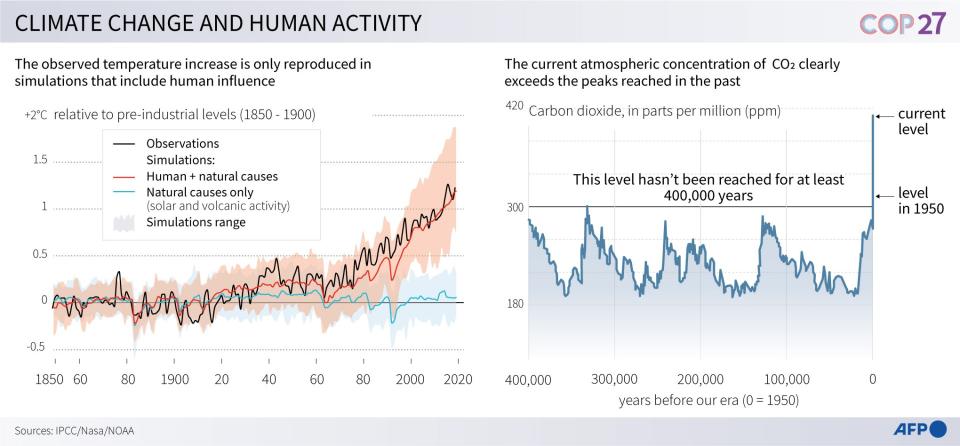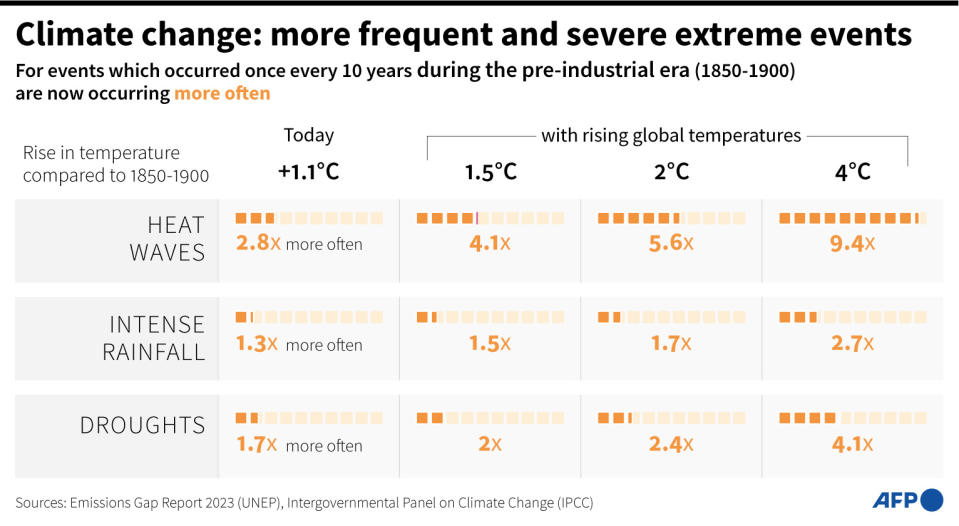High temperatures in Greece in 1965 do not disprove climate change
Greece experienced what meteorologists described as a historic heatwave in June 2024 when temperatures soared to 43 degrees Celsius in many parts of the country. Nevertheless, social media users denied that climate change was the cause, arguing that temperatures had already reached comparable levels in the Greek city of Larissa in the summer of 1965. But this is misleading. While temperatures were indeed extremely high in Larissa that year, experts and various scientific reports confirm that climate change is real and average temperatures have risen in recent years.
"The same old climate change candy", said this Facebook post on June 22, 2024 which has since been shared more than 1,500 times. The post, with the hashtag "#This day in 1965", includes a screenshot of an old newspaper article headlined "Temperature in Larissa 45.4 in the shade".
"Tropical heatwave throughout the country -- forecast to fall. Unbearable heat prevailed during the past twenty-four hours in the entire Greek territory with a temperature of 45 degrees in the shade in Thessaly", the article said.
The misleading claim with the screenshot of the old newspaper article spread on Greek social media a few days after a heatwave in Greece in June 2024, which experts warned would "go down in history" (archived here).
Similar claims with the same screenshot were posted by other users on Facebook (here) and X (here, here and here). "Climate change has existed since then but they hid it from us... Enough with the fairy tale...", wrote one user.

The newspaper clipping is authentic and was taken from "Eleftheria", a daily newspaper published between 1944 and 1967.
A search of the archive of the Digital Library of Newspapers and Periodical Press of the National Library of Greece found that the article was published in issue number 6402 of the newspaper from July 28, 1965.

The article does not disprove the existence of climate change, which scientists say has made heatwaves more frequent and intense.
Climate-change deniers often publish data on extreme temperatures allegedly recorded decades ago to imply scientists are exaggerating global warming (archived here). AFP has previously verified such claims, for example here and here.
Heatwaves are nothing new, but experts say that global warming increases the frequency and intensity of extreme weather events, and comparing such events to the past is misleading.
High temperatures in 1965
The extreme heat experienced in the Larissa and Thessaly regions in the summer of 1965 was covered by other media at the time. The "Macedonia" daily reported on page 7 of its July 28, 1965 issue that "45 degrees in the shade" were recorded in Larissa, where the streets "were deserted and work in the countryside was suspended", as shown in the screenshot below. The article refers to the weather of July 27, 1965.

Already on July 30, 2015, another newspaper also called "Eleftheria" published an article (archived here) listing the 10 highest temperatures recorded in Larissa in the month of July since 1955. The data -- provided by meteorologist Panagiotis Skrimizeas -- gave the temperature on July 27, 1965 as 43.4 degrees Celsius.
Kostas Lagouvardos, meteorologist and research director of the National Observatory of Athens told AFP in a phone call on July 2, 2024 that an isolated incident of very high temperatures is not proof of the existence or non-existence of climate change. The important thing is that "we now have systematically very high averages", he said.
For example, in Greece from 1991 to 2020 "the temperature has risen by 1.5 to 2 degrees", Lagouvardos told AFP.
This was largely due to climate change, the expert continued. "In such a short period of time we have never on Earth had such large temperature increases in such a short period of time... and before '65, and in the 1920s and 1930s, there were high temperatures (in Greece), but we didn't have this systematic warming," he said.
Climate change is real
In an article from 2021, the Research and Policy Institute Dianeosis -- which conducted research into the consequences of climate change in Greece (archived here) -- said that climate change describes "the gradual warming of our planet's atmosphere recorded over the past 150 years". And global warming is largely a result of the so-called "greenhouse effect". Gases such as carbon dioxide act like glass in a greenhouse: they absorb the sun's heat radiating from the Earth's surface, trapping it in the atmosphere and preventing it from escaping into space. The greenhouse effect keeps Earth's temperature warmer than it would otherwise be.
There is worldwide consensus (archived here) among scientists about the human causes of global warming. In its sixth assessment report (archived here), published between 2021 and 2023, the Intergovernmental Panel on Climate Change (IPCC) warned that urgent action was needed to reduce greenhouse gas emissions to avoid catastrophic global warming.
The IPCC summarised the trend in a chart (below) in a report in August 2021 (archived here). The chart on the left shows that temperatures have risen sharply over the past 150 years. The diagram on the right shows how much lower global temperatures would be without emissions of carbon dioxide and other greenhouse gases from human activity.

Heatwaves in Greece
In a 2022 report, the European Environment Agency stated that "the duration and intensity of heatwaves dangerous to human health are increasing and are projected to further increase substantially across Europe under all climate scenarios, especially in southern Europe" (archived here).

And in July 2023, researchers from the World Weather Attribution (WWA) group said that the blistering heat that had baked swathes of North America and Europe, including Greece, that month would have been "virtually impossible" without human-caused climate change (archived here).

Lagouvardos from the National Observatory of Athens told AFP that according to an article (archived here) examining the frequency of heatwaves in Greece since 1950, "there is an increase in both their frequency, their duration and their occurrence now in the months earlier than normal, which is July and August."
Another research team headed by Professor Kostas Kartalis of the University of Athens looked at the likely effects of climate change on tourism, primary production and urban life in the coming decades.
The researchers concluded that "according to estimates, by 2050 heatwave days in Greece will increase by 15-20 days per year, rainfall will decrease by 10% to 30%, high fire-risk days will increase by 15% to 70% and extreme weather events will be much more frequent".
"The country is gradually acquiring a warmer and drier climate, with extreme weather events that will be more intense, more frequent and longer lasting", the researchers said in their publication (archived here).
AFP has previously verified misleading or false claims about the climate, here in Greek and here in English.


